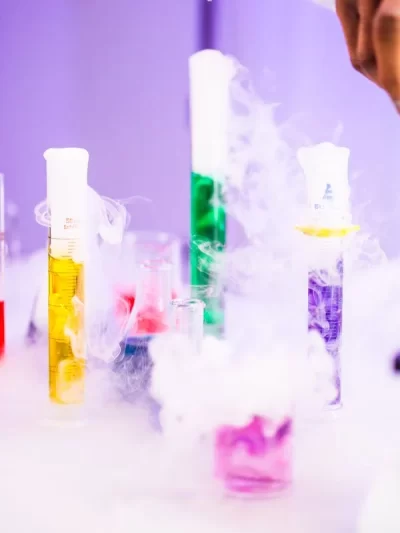Science experiments can be exciting and full of discovery, but sometimes they don't go as planned. Here are a few reasons why science experiments
Science experiments can be exciting and full of discovery, but sometimes they don’t go as planned.
Here are a few reasons why science experiments may not work out the expected way.
- Experimental Variables: Science experiments involve manipulating various variables to observe their effects. If you overlook or unintentionally change a variable, it can lead to unexpected results. It’s important to carefully control and document all variables involved in the experiment to ensure reliable outcomes.
- Measurement Errors: Accurate measurements are crucial in scientific experiments. Even slight errors in measuring equipment or human error during data collection can affect the results. It’s essential to use proper measuring tools, follow correct procedures, and repeat measurements to minimize errors.
- Imperfect Conditions: Scientific experiments often require controlled conditions. Factors such as temperature, humidity, and lighting can influence the outcome. If the experimental conditions are not precisely controlled or if there are external interferences, the results may deviate from your expectations.
- Unforeseen Interactions: In complex systems, there can be interactions between variables that are difficult to predict. These interactions may lead to unexpected outcomes. It is essential to consider all possible factors and test the experiment under different conditions to uncover these interactions.
Here are some more reasons why science experiments may not work out the expected way.
- Incomplete Understanding: Sometimes, an experiment may not yield the expected results because our understanding of the underlying scientific principles is incomplete or inaccurate. Science is an ongoing process of learning and refining knowledge. Unexpected outcomes can provide valuable insights that challenge existing theories and lead to new discoveries.
- Random Chance: In some cases, random chance or statistical variation can play a role. No experiment is entirely free from statistical fluctuation, and results can deviate from the expected outcome due to natural variability. Repetition of experiments and statistical analysis can help account for these variations.
- Procedural Errors: Scientific experiments require precise execution of procedures. Mistakes in following the experimental protocol, such as incorrect mixing, timing, or contamination, can impact the results. Careful attention to detail and adherence to the experimental procedure are crucial to obtaining accurate and reproducible outcomes.

Here are a few of the most common reasons.
- Not following the instructions carefully. It is important to follow the instructions for your science experiment carefully. Even small deviations from the instructions can lead to unexpected results.
- Using the wrong materials. Make sure to use the correct materials for your science experiment. Using the wrong materials can lead to the experiment failing or producing inaccurate results.
- Not measuring the ingredients correctly. It is important to measure the ingredients for your science experiment accurately. Even small errors in measurement can lead to unexpected results.
- Not controlling the variables. When conducting a science experiment, it is important to control all of the variables except for the one you are testing. This will help you to identify the cause-and-effect relationship between the variables.
- Not accounting for experimental error. All science experiments have some degree of experimental error. This is due to factors that cannot be controlled, such as the accuracy of the measuring equipment and the environment in which the experiment is conducted.
Here are some tips for increasing the chances of success for your science experiments:
- Read the instructions carefully and follow them exactly.
- Use the correct materials.
- Measure the ingredients accurately.
- Control all of the variables except for the one you are testing.
- Account for experimental error.
It is also important to remember that science is all about trial and error. Don’t be discouraged if your experiment doesn’t work out the way you planned. Just keep trying and experiment with different things until you get the results you want.
Here are some additional tips for making your science experiments more fun and engaging:
- Choose a topic that you are interested in. This will make you more likely to stick with the experiment and see it through to the end.
- Be creative and come up with your own experiments. Don’t be afraid to try new things and see what happens.
- Share your results with others. This is a great way to learn from others and get feedback on your work.
Science is a great way to learn about the world around us. By conducting science experiments, we can discover new things and test our hypotheses. Even if your experiment doesn’t work out the way you planned, you will still learn something from it. So don’t be afraid to experiment and have fun!
It’s important to remember that unsuccessful experiments can still contribute to scientific progress by providing valuable insights, prompting new questions, and guiding further investigations. Analyzing and understanding why an experiment didn’t work as planned is an integral part of the scientific process, leading to improved experimental design and a deeper understanding of the phenomenon being studied.
thanks for reading.
For more different topics visit the next links.
The worst life technologies in history
Discover the Jewels of Phuket-Thailand: Must-Visit Destinations and Hidden Gems
Electronic gadgets-security measures that experts look for.


COMMENTS
Hello, of course this piece of writing is in fact good and I have learned lot of things from it about blogging. thanks.
Thanks a lot for your comment. I hope to give you more useful articles that appeal to you.